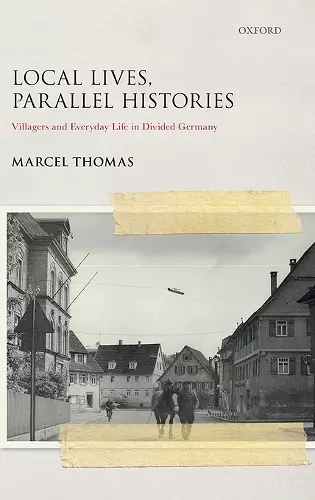Local Lives, Parallel Histories
Villagers and Everyday Life in Divided Germany
Format:Hardback
Publisher:Oxford University Press
Published:23rd Apr '20
Currently unavailable, and unfortunately no date known when it will be back

The division of Germany separated a nation, divided communities, and inevitably shaped the life histories of those growing up in the socialist dictatorship of the East and the liberal democracy of the West. This peculiarly German experience of the Cold War is usually viewed through the lens of divided Berlin or other border communities. What has been much less explored, however, is what division meant to the millions of Germans in the East and West who lived far away from the Wall and the centres of political power. This volume is the first comparative study to examine how villagers in both Germanies dealt with the imposition of two very different systems in their everyday lives. Focusing on two villages, Neukirch (Lausitz) in Saxony and Ebersbach an der Fils in Baden-Württemberg, it explores how local residents experienced and navigated social change in their localities in the postwar era. Based on a wide range of archival sources as well as oral history interviews, the work argues that there are parallel histories of responses to social change among villagers in postwar Germany. Despite the different social, political, and economic developments, the residents of both localities desired rural modernisation, lamented the loss of 'community', and became politically active to control the transformation of their localities. The work thereby offers a bottom-up history of divided Germany which shows how individuals on both sides of the Wall gave local meaning to large-scale processes of change.
This should be a stimulating read for all those asking about the fate of 'community' or trying to understand why German unification still isn't over. It sheds new light on the integration of migrants in Germany and on the complex politics of the periphery. It would make a great addition to the library of any postwar historian and should find its way into many syllabi. It is already in mine. * Sagi Schaefer, German History *
Marcel Thomas' fascinating comparison of two villages illustrates the similarities and differences in rural life in West Germany (FRG) and East Germany (GDR). In so doing, Thomas successfully challenges the traditional approach of treating the rural as backward and villagers as passive in the context of wider social change. * George Gibson, Agricultural History Review *
[Thomas's] study adopts a comparative approach rooted in the everyday history of the local in order to contribute to a broader post-war East–West German shared history -- one with a social history slant -- that builds on the detailed existing picture of East–West differences by documenting connections and appropriations between the two systems ... will be of interest to scholars of East–West German histories and the transformation of rural and urban spaces alike. * Frank Kell, German Historical Institute London Bulletin *
ISBN: 9780198856146
Dimensions: 239mm x 161mm x 24mm
Weight: 640g
320 pages